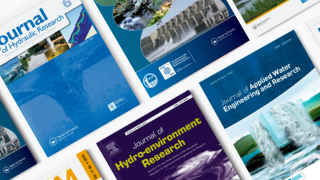Open Call for Article Collections in IAHR Journals!
 IAHR invites proposals for Article Collections in its journals as a way to highlight cutting-edge topics and emerging areas of research.
IAHR invites proposals for Article Collections in its journals as a way to highlight cutting-edge topics and emerging areas of research.
An Article Collection is a curated group of papers on a specific theme. Each article is published in a regular issue of the journal as soon as it is accepted, without waiting for the rest of the contributions. Articles are tagged with the name of the Collection, making them easily searchable and visible as part of the special compilation.
While some Article Collections are organized in connection with a conference or related event, they can also be developed independently, without any formal link to a meeting.
Guidelines to produce an Article Collection in IAHR Journals for Guest Editors
How to propose an Article Collection
Guest Editors interested in organizing an Article Collection in an IAHR Journal must prepare and submit an initial proposal to the IAHR Publications Manager at publications@iahr.org
The proposal should include: a provisional title, main subject areas, full contact details of Guest Editors, estimated deadlines, expected number of articles, and any link to conferences or related activities and a related image.
This information should be provided using the Article Collection Proposal.
The proposal will be reviewed by the Editor-in-Chief and/or the publisher before proceeding with the Call for Papers.
Once the proposal is accepted, IAHR will liaise with Taylor & Francis to configure the submission platform and launch the Call for Abstracts.
Role of the Guest Editor(s)
Oversee the compilation of the Article Collection.
Identify and invite articles aligned with the theme of the Article Collection.
Ensure the submissions meet the journal’s Aims & Scope and adhere to the Instructions for Authors.
Manage the peer review process: invite referees, provide feedback, request revisions, and make recommendations/decisions on manuscripts.
Reject submissions that do not meet the scientific standards, scope, or deadlines of the Article Collection.
Maintain communication with the journal editor, submitting regular progress updates.
Try that authors meet the delivery deadline.
Write an Editorial outlining the aim, scope, and key highlights of the Article Collection.
Revision process
All manuscripts must be submitted via the journal’s online submission system.
Guest Editors are assigned submissions for their Article Collection and oversee the review workflow.
Peer review must involve at least two independent reviewers.
Acceptance is only granted once the paper is in final publishable form.
Timeline
Guest Editors must fix and communicate the external deadlines to authors when preparing the Call for Papers. Editorial workflow deadlines apply once manuscripts are submitted into the journal’s online system.
Phase 1 – Planning and Communication with Authors (Pre-submission)
Guest Editor must fix deadline for authors to submit papers: *add deadline*.
Guest Editor must fix deadline to return final manuscripts to the publisher: *add deadline*.
Phase 2 – Editorial Workflow (Within the Submission System)
Recommended peer review turnaround: ~6 weeks for first reviews, ~4 weeks for revisions.
Production and Promotion
Ensure final manuscripts meet formatting and style requirements.
Clear any copyright or permissions issues before submission to production.
Support promotion of the Article Collection, including conference outreach, social media, and academic networks.
For Authors (to be contacted by the Guest Editor)
Submit manuscripts via the journal’s online system, selecting the title of your Article Collection –in the dropdown menu configurated in S1M. - Each manuscript will undergo rigorous peer review, similar to any regular submission.
Once accepted, papers will be published in a regular issue of and listed in the Article Collection.
Authors are encouraged to provide supplementary content such as videos, datasets, or graphical abstracts.
Authors are encouraged to consider Open Access publication: Check if your institution is part of the T&F agreements to publish your paper Open Access for Free
After publication, authors are encouraged to promote their work through academic networks and social media.
For more information on Article Collections in T&F please visit their website
Planned collections
JHR
Call for Articles for a JHR Special Issue on Sediment Transport in Large Rivers Guest Editor: Junqiang Xia
Call for papers for a JHR Article Collection on Breaching of Earthen Dam and Dike Structures: Lessons Learned from Recent Field, Laboratory, and Numerical Studies. Guest Editors: Sandra Soares- Frazao, Silvia Amaral and Matthew Halso
Call for papers for a JHR Article Collection on Hydraulics of Sediment Transport and Scour Guest Editor: Subhasish Dey
Field observations of large hydraulic structures operating during floods. Guest Editor: Hubert Chanson
Innovations in Hydraulic Structures for Resilient Water Systems. Guest Editor: Valentin Heller and the IAHR Technical Committee on Hydraulic Structures
JRBM
Call for papers for a JRBM Article Collection on Water Management in Remote Regions and Transboundary Basins. Guest Editors: Ramesh Teegavarapu, Elpida Kolokytha and Michael Nones (closed)
Call for papers for a JRBM Special Issue on River Resilience. Guest Editors: Phanikumar Mantha, Saket Pande and Santosh G Thampi (closed)
Call for Papers for a JRBM Special Collection on African Water Security in the International Journal of River Basin Management. Guest Editor: Moez Louati (closed)
Call for papers for JRBM Article Collection on From data to decision: stakeholder-driven approaches for a resilient water future. Guest Editors: Pedro Martínez-Santos, Albretch Weerts, Harm Duel, Helmut Habersack, Michiel Blind, Leandro Ávila, Maggie Kossida, Virginie Keller and Julie Collignan
RIBAGUA. Revista Iberoamericana del Agua
Upcoming article collection on droughts. Editor: Victor Arqued
International Symposium on Ecoydraulics 2026 Guest Editor Giulio Calvani